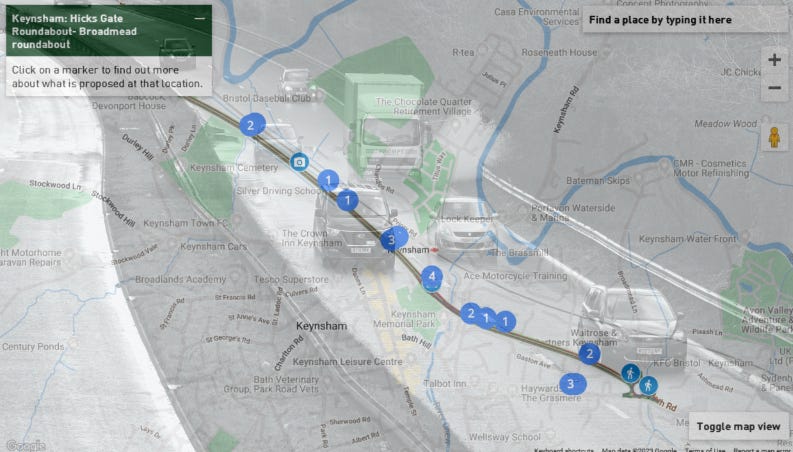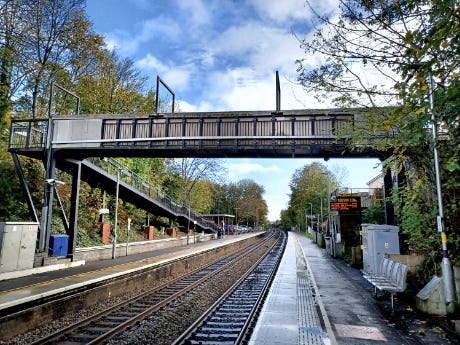This post was originally published on our now deleted sister blog, The Stirrer. We're re-publishing it here because it's a classic example of the lack of joined up, holistic thinking from those who presume to rule over us. In this case, it's a proposed scheme, funded by government money with a lot of strings attached, for re-engineering a main road between two cities in a bid to get people out of their cars and instead, using buses, cycling and in some instances, walking.
The West of England Combined Authority (WECA) comprises the local authority regions of Bath & North East Somerset, South Gloucestershire and Bristol. WECA have access to a pot of money from central government for infrastructure 'improvements' along the route of the A4 main road between Bristol and Bath. They have come up with proposals they claim will encourage a switch to using the bus or cycling. There's a time frame for these plans to be implemented before access to this pot of money is lost.
These proposals have been subjected to the first phase of consultation which took place back in September. WECA are currently mulling over the submissions and thinking about what was said to them at the in person consultation events before coming back with revised proposals. Suffice to say, residents along the A4 corridor between Bristol and Bath are less than impressed with what has been proposed so far: Major changes planned for Bristol to Bath corridor have left residents 'incredulous' 30.9.23.
We'll declare an interest in that we live next to the Keynsham bypass as it carries the A4 around the town centre. Living where we do, we have a material interest in seeing a reduction in traffic using the bypass. However, the more we look at what WECA has proposed for the A4, the more it's obvious that these plans just don't stack up.
The major problem lies with the fact that the pot of money from the government has strings attached to it. The strings being that it can only be spent on infrastructure such as putting in bus lanes and cycle paths. It can't be spent on subsidising extra bus services that could take advantage of the new bus lanes. WECA can build all of the bus lanes they like but, there's no guarantee that the bus operators will respond by upping the number of services they run along the route. The only guarantee of extra bus services that could use the bus lanes would be if we had a fully public owned bus operator. Well, as things currently stand, there's sod all chance of that happening!
So, we could potentially end up with a situation where there are bus lanes both ways along the Keynsham bypass but no extra buses while all the other traffic is confined to one lane in each direction. Confining traffic to one lane in each direction could well lead to it being snarled up, which far from improving our air quality, would actually exacerbate the pollution we're subjected to.
If WECA are serious about reducing the volume of traffic using the A4 between Bristol and Bath, they'd turn round to the government and tell them outright that a pot of money with strings attached meaning they can only spend it on road infrastructure, isn't going to deliver that objective. Instead WECA have taken the option of spending the money on offer and have come up with a set of proposals which are, to put it politely, half baked.
Any serious plan to reduce the volume of traffic along the A4 between Bristol and Bath would be looking at enhancing the rail service between the two cities, and beyond. That would mean a more frequent metro style service, longer train formations and ideally, new rolling stock and one day, electrification. It would also mean re-opening long closed stations at Saltford and St. Anne's - doing this would be a real game changer. There are discussions happening about a mass transit system for Bristol and the surrounding region but, these have been going on for so long with so much political bickering, people in the region are giving up hope of anything ever materialising.
Also, before launching any plan to reduce the volume of traffic using the A4, and other roads in the region, would it not be a good idea to investigate why people feel that driving is the only option open to them? An understanding of why and how people make journeys for work, leisure, visiting family and friends, and the many other reasons why people move would seem to be the logical starting point for any coherent long term transport planning. However, it would mean having to confront the uncomfortable truth about decades of planning assumptions that have assumed near universal car ownership, and the way our cities, towns and suburbs have grown as a result. A situation that's very difficult to remedy without addressing some very fundamental questions about the way we live - ones which we attempt to answer in this piece: The future of movement on a finite planet 21.2.23.
As the title of this piece suggests, the proposals from WECA to spend a pot of government money with strings attached is a classic example of a dearth of joined up thinking from those who presume to rule over us. It takes the residents living along the Bristol to Bath corridor to point out the numerous flaws in the proposals and say that unless an enhanced rail service is in the mix, WECA's aim of traffic reduction will never be realised. All of which goes to show just how out of touch WECA are with reality...





You've nailed it, as usual.
Sounds like the kind of nonsense we were seeing all the time when I lived in Portland, OR.